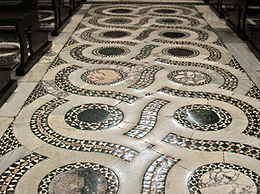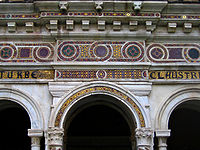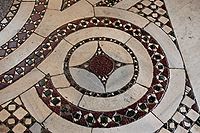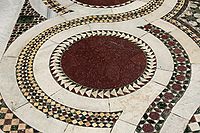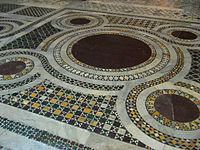- Cosmatesque
-
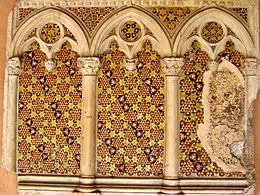 Cosmatesque screen at the Basilica di San Giovanni in Laterano. Some works of Deodatus di Cosma for Colonna family are housed in the basilica.
Cosmatesque screen at the Basilica di San Giovanni in Laterano. Some works of Deodatus di Cosma for Colonna family are housed in the basilica.
Cosmatesque, or Cosmati, is a style of geometric decorative inlay stonework typical of Medieval Italy, and especially of Rome and its surroundings. It was used most extensively for the decoration of church floors, but was also used to decorate church walls, pulpits, and bishop's thrones. The name derives from the Cosmati, the leading family workshop of marble craftsmen in Rome who created such geometrical decorations. The style spread across Europe, where it was used in the most prestigious churches; the high altar of Westminster Abbey, for example, [1] [2] is decorated with a cosmatesque marble floor.
Contents
Description and early history
The Cosmatesque style takes its name from the family of the Cosmati, which flourished in Rome during the twelfth and thirteenth centuries and practiced the art of mosaic. The Cosmati work has this peculiarity, that it is a glass mosaic used in combination with marble. At times it is inlaid on the white marble architraves of doors, on the friezes of cloisters, the flutings of columns, and on sepulchral monuments. Again, it frames panels, of porphyry or other marbles, on pulpits, episcopal chairs, screens, etc., or is itself used as a panel. The color is brilliant, — gold tesserae being freely used. While more frequent in Rome than elsewhere, its use is not confined to that city. Among other places it is found in the Cappella Palatina in Palermo. Just what its connection may be with the southern art of Sicily has yet to be determined.[3]
Although the Cosmati of 12th Century Rome are the eponymous craftsmen of the style, they do not seem to have been the first to develop the art. A similar style may be seen in the pavement of the Benedictine abbey of Monte Cassino (1066-1071), built using workers from Constantinople, making it likely that the geometric style was heavily influenced by Byzantine floor mosaics. However, the technique is different, because Cosmati floors were made from many different size and shape pieces of stone, a technique quite different from opus tessellatum mosaics where the patterns are made from small units which are all the same size and shape. The stone used by the cosmati artists were salvaged material from the ruins of ancient Roman buildings, the large roundels being the carefully cut cross sections of Roman columns [4].
According to the Catholic Encyclopedia, this style of inlaid ornamental mosaic was "introduced into the decorative art of Europe during the twelfth century, by a marble-worker named Laurentius [also known as "Lorenzo Cosmati"[5]], a native of Anagni, a small hill-town thirty-seven miles east-south-east of Rome. Laurentius acquired his craft from Greek masters and for a time followed their method of work, but early in his career, freeing himself from Byzantine traditions and influences, he worked along original lines and evolved a new style of decorative mosaic, vigorous in colour and design, which he invariably employed in conjunction with plain or sculptored marble surfaces, making it a decorative accessary to some architectural feature.
"As a rule he used white or light-coloured marbles for his backgrounds; these he inlaid with squares, parallelograms, and circles of darker marble, porphyry, or serpentine, surrounding them with ribbons of mosaic composed of coloured and gold-glass tesseræ. These harlequinads he separated one from another with marble mouldings, carvings, and flat bands, and further enriched them with mosaic. His earliest recorded work was executed for a church at Fabieri in 1190, and the earliest existing example is to be seen in the church of Ara Coeli at Rome. It consists of an epistle and gospel ambo, a chair, screen, and pavement.
"In much of his work he was assisted by his son, Jacobus, who was not only a sculptor and mosaic-worker, but also an architect of ability, as witness the architectural alterations carried out by him in the cathedral of Civita Castellana, a foreshadowing of the Renaissance. This was a work in which other members of his family took part, and they were all followers of the craft for four generations. Those attaining eminence in their art are named in the following genealogical epitome: Laurentius (1140-1210); Jacobus (1165-1234); Luca (1221-1240); Jacobus (1213-1293); Deodatus (1225-1294); Johannes (1231-1303)."[6]
Terminology
Cosmatesque work is also known as opus alexandrinum.[7] Definitions of this term, and the distinction between it and opus sectile, vary somewhat. Some restrict opus alexandrinum to the typical large designs, especially for floors, using white guilloche patterns filled in with roundels and bands in coloured designs using small pieces.[8] Others include any geometric design including large pieces, as in the picture from Spoleto (right side) below, whereas opus sectile also includes figurative designs made in the same technique.
Opus alexandrinum is another form of opus sectile, where but few colors are used, such as white and black, or dark green on a red ground, or vice versa. This term is particularly employed to designate a species of geometrical mosaic, found in combination with large slabs of marble, much used on the pavements of medieval Roman churches and even in Renaissance times, as, for instance, on the pavements of the Sistine Chapel and the stanza of the Segnatura.
Examples in Rome
Among the churches decorated in cosmatesque style in Rome, the most noteworthy are San Lorenzo fuori le Mura, San Saba, San Paolo fuori le Mura, Santa Maria in Aracoeli, Santa Maria in Cosmedin, Santa Maria Maggiore and the Stanza della Segnatura at the Vatican. Outside Rome, Anagni and Ferentino contain remarkable cosmatesque works. Also, Cosmati built innovative decoration for the church of Santa Maria di Pozzano at Civita Castellana.
Gallery
-
Detail of Cosmatesque floor, from the central nave of the Basilica di Santa Maria Maggiore, Rome.
-
Detail of Cosmatesque floor, from the central nave of the Basilica di Santa Maria Maggiore, Rome.
-
Detail of Cosmatesque floor, from Santa Maria in Aracoeli, Rome.
-
Two columns with Cosmatesque ornament in the cloister of San Paolo fuori le Mura, Rome.
-
Detail of Cosmatesque floor, in the Basilica di Santa Maria in Cosmedin.
-
Detail of Cosmatesque floor, in Santa Croce in Gerusalemme, Rome.
-
Cosmatesque floor, from the Chiesa di San Benedetto in Piscinula, in the Trastevere section of Rome.
Notes
- ^ The Guardian, Maev Kennedy, Carpet of stone: medieval mosaic pavement revealed [1]
- ^ http://www.bbc.co.uk/cultureshow/videos/2009/08/s6_e5_cosmati/index.shtml
- ^ excerpted from A dictionary of architecture and building, biographical, historical, and descriptive by Russell Sturgis (1836-1909), published 1901 and out of copyright [2]
- ^ Paloma Pajares-Ayuela Cosmatesque Ornament, p.255
- ^ A dictionary of architecture and building, p.691 Cosmati. [3]
- ^ Catholic Encyclopedia, Cosmati Mosaic. [4]
- ^ Ayuela, Paloma Pajares (April 1, 2002). Cosmatesque Ornament. W. W. Norton & Company. ISBN 0-393-73037-9. Page 30.
- ^ Fawcett, Jane, Historic floors: their history and conservation, Butterworth-Heinemann, 1998, ISBN 0750627654, 9780750627658, Google books
See also
External links
- Catholic Encyclopedia article on Cosmati Mosaic
- Cosmatesque pavement of S. Maria in Cosmedin (with photographs)
- The high altar of Westminster Abbey
 This article incorporates text from a publication now in the public domain: Herbermann, Charles, ed (1913). Catholic Encyclopedia. Robert Appleton Company.Categories:
This article incorporates text from a publication now in the public domain: Herbermann, Charles, ed (1913). Catholic Encyclopedia. Robert Appleton Company.Categories:- Architectural styles
- Medieval art
- Mosaic
Wikimedia Foundation. 2010.

